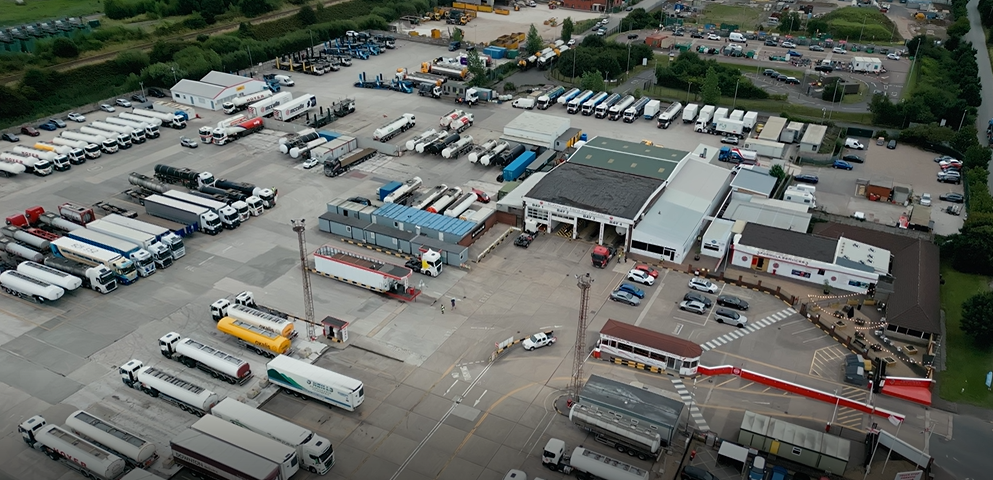
Miranda Blake
Arbeitszeitrichtlinie für Kraftfahrer: Ein Leitfaden für Lkw-Fahrer
Erstellt: 25.10.2024
•
Aktualisiert: 29.10.2024
Als Lkw-Fahrer im Vereinigten Königreich ist es von entscheidender Bedeutung, die komplexen Vorschriften zu den Arbeits- und Ruhezeiten der Fahrer zu kennen. Die Arbeitszeitrichtlinie für Fahrer (WTD), auch bekannt als Straßenverkehrsrichtlinie, ist ein Regelwerk, das die maximale Arbeitszeit eines Fahrers, die vorgeschriebenen Pausen und die vorgeschriebenen Ruhezeiten regelt, die er einhalten muss. Die Nichteinhaltung dieser Vorschriften kann zu hohen Geldstrafen und sogar zur Stilllegung Ihres Fahrzeugs führen.
Die Arbeitszeitrichtlinie für Kraftfahrer verstehen
Die Arbeitszeitrichtlinie für Kraftfahrer ist eine Rechtsvorschrift der Europäischen Union, die die Sicherheit aller Verkehrsteilnehmer gewährleisten soll, indem sie Unfälle durch Übermüdung verhindert. Die [Fahrerarbeitszeitrichtlinie] (https://snapacc.com/newsroom/discover-the-new-drivers-hours-rules/) gilt für Fahrer von Fahrzeugen mit einem Gewicht von mehr als 3,5 Tonnen, unabhängig davon, ob sie innerhalb des Vereinigten Königreichs oder in der EU tätig sind.
Tägliche Fahrbeschränkungen
Nach der WTD gilt für Lkw-Fahrer im Vereinigten Königreich eine tägliche Höchstlenkzeit von 9 Stunden, die maximal zweimal pro Woche auf 10 Stunden erhöht werden kann. Nach 4,5 Stunden ununterbrochener oder unterbrochener Fahrt müssen die Fahrer eine Pause von mindestens 45 Minuten einlegen. Alternativ können sie sich auch für eine geteilte Pause entscheiden, bei der die erste mindestens 15 Minuten und die zweite mindestens 30 Minuten beträgt.
Wöchentliche und vierzehntägige Fahrverbote
Für britische Lkw-Fahrer gibt es eine wöchentliche Höchstarbeitszeit von 56 Stunden, während die zweiwöchentliche Höchstarbeitszeit 90 Stunden beträgt. Das bedeutet, dass ein Fahrer, der in einer Woche 56 Stunden fährt, in der darauffolgenden Woche nur 34 Stunden arbeiten darf, um sicherzustellen, dass er die 90-Stunden-Grenze für zwei Wochen nicht überschreitet.
Arbeitszeitkappen
Zusätzlich zu den Lenkzeitbeschränkungen legt die WTD auch Grenzen für die Gesamtzahl der Stunden fest, die ein Fahrer pro Woche arbeiten darf. Die durchschnittliche Wochenarbeitszeit, die sowohl Fahr- als auch Nichtfahraufgaben umfasst, darf 48 Stunden nicht überschreiten, berechnet über einen 17- oder 26-wöchigen Bezugszeitraum. Die Höchstarbeitszeit in einer einzigen Woche beträgt 60 Stunden, sofern die durchschnittliche Arbeitszeit von 48 Stunden nicht überschritten wird.
Ruhezeiten
Die WTD verpflichtet [Lkw-Fahrer] (https://snapacc.com/newsroom/how-to-become-an-hgv-driver/) zu einer täglichen Ruhezeit von mindestens 11 zusammenhängenden Stunden, die in zwei Zeiträume aufgeteilt werden kann, wobei der erste mindestens 3 Stunden lang sein muss. Die Fahrer können sich auch für eine verkürzte tägliche Ruhezeit von neun Stunden entscheiden, was jedoch nur bis zu dreimal pro Woche möglich ist. Darüber hinaus ist eine wöchentliche Ruhezeit von mindestens 45 Stunden vorgeschrieben, die jedoch einmal in einem Zeitraum von zwei Wochen auf 24 Stunden verkürzt werden kann.

Ausnahmen
Die Arbeitszeitrichtlinie gilt zwar für die meisten Lkw-Fahrer im Vereinigten Königreich, doch gibt es bestimmte Ausnahmen, die unter bestimmten Umständen gelten können. So müssen diejenigen, die innerhalb eines Zeitraums von 26 Wochen nicht mehr als 10 Fahrten oder innerhalb eines Zeitraums von mehr als 26 Wochen nicht mehr als 15 Fahrten durchführen, ihre Arbeitszeitrichtlinie nicht überwachen.
Folgen der Nichteinhaltung
Die Nichteinhaltung der WTD kann sowohl für Fahrer als auch für [Flottenbetreiber] schwerwiegende Folgen haben (https://snapacc.com/fleet-operators/). Fahrer, die bei Verstößen gegen die Vorschriften erwischt werden, können mit Geldbußen von bis zu 1.500 £ bestraft werden, und wenn sie innerhalb von 28 Tagen mehr als fünf Mal gegen die Vorschriften verstoßen, können sie vor Gericht gestellt und ihr Fahrzeug stillgelegt werden.
Die Flottenbetreiber sind verpflichtet, die Einhaltung der Vorschriften in der gesamten Flotte sicherzustellen. Werden keine ausreichenden Maßnahmen zur Überwachung und Durchsetzung der WTD ergriffen, kann dies dazu führen, dass die DVSA eine Aufforderung zur Nachbesserung ausspricht und im Extremfall die Einstellung des Betriebs verlangt, bis die Probleme behoben sind.
Bedeutung von in den Fahrtenschreiber integrierten Flottenmanagementlösungen
Um die Arbeitszeiten der Fahrer effektiv zu verwalten und die Einhaltung der Arbeitszeitrichtlinie zu gewährleisten, sollten Fuhrparkbetreiber die Investition in in den Fahrtenschreiber integrierte Flottenmanagementlösungen in Betracht ziehen. Diese speziell entwickelten Technologien ermöglichen eine effiziente Überwachung des Fahrerverhaltens und die automatische Aufzeichnung von Fahr- und Arbeitszeitdaten, so dass es praktisch unmöglich ist, dass Verstöße gegen die Vorschriften unbemerkt bleiben.
Durch die Zusammenarbeit mit einem vertrauenswürdigen Anbieter wie SNAP können Flottenbetreiber modernste Flottenmanagement-Tools nutzen und erhalten Zugang zu einem umfassenden Netzwerk von Servicepartnern, um sicherzustellen, dass ihre Fahrer die Unterstützung erhalten, die sie benötigen, um die Vorschriften einzuhalten und sicher unterwegs zu sein.
Auswirkungen des Fahrermangels
Man muss auch den [Fahrermangel] (https://snapacc.com/newsroom/hgv-drivers-challenge-the-term-driver-shortage/) im Vereinigten Königreich berücksichtigen. Er erweist sich als ein großes Problem in der Branche. Die Branche hat einen Rückgang der Lkw-Fahrer zu verzeichnen - durch die Pandemie wurden 30.000 Prüfungen für neue Fahrer verschoben, und der Brexit hat die Fuhrparkunternehmen hart getroffen - viele europäische Lkw-Fahrer verlassen das Vereinigte Königreich.
Ein Bericht von SNAP aus dem Jahr 2023 legt nahe, dass der Sektor in den nächsten 10-15 Jahren einen "Wendepunkt" erreichen könnte. Es könnte sich herausstellen, dass die Arbeitszeitrichtlinie für Kraftfahrer genau das ist, was die Branche braucht, um den Beruf wieder erstrebenswert zu machen und ein besseres Gleichgewicht für Fahrer zu schaffen. Erfahren Sie mehr darüber, was getan werden kann, um den Fahrermangel zu bekämpfen, indem Sie [den Bericht lesen] (https://snapacc.com/tipping-point/).



